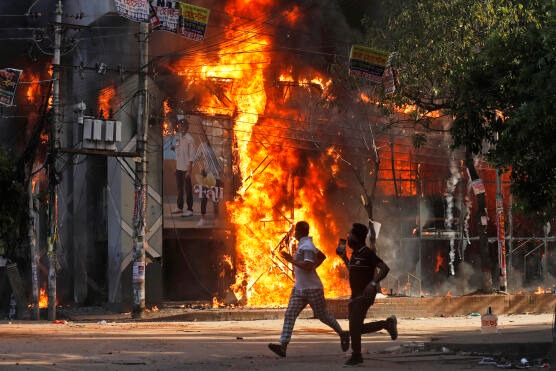01/10/2024
Garment Worker Killed Amid Bangladesh’s Labor Protests
One person was shot dead and at least 20 others were injured in Bangladesh on Monday after a clash between garment workers and security forces escalated in the industrial suburb of Ashulia, near Dhaka, leading to the closure of several factories, as Sourcing Journal reports.
Local media reports have identified the deceased man as Kawsar Hossain Khan, a 27-year-old employee at Mango Tex. He was part of a group of several hundred protestors calling for higher wages and improved working conditions.
The workers blocked the Nabinagar-Chandra highway, threw bricks at police vehicles, and hurled rocks at officers, according to a law enforcement official.
The Bangladesh Garment Manufacturers and Exporters Association (BGMEA), also known as the BGMEA, expressed its condolences to Khan’s family at a press conference the same evening.
They presented a gift of 500,000 Bangladeshi taka ($4,187) and called for “enhanced safety measures” due to ongoing disruptions that have worsened production delays caused by the anti-government uprising and recent floods.
“We are demanding safety, and without it, the factories will suffer due to the labor unrest,” said Abdullah Hil Rakib, senior vice president at the BGMEA, addressing reporters.
The Bangladesh Garment Manufacturers and Exporters Association (BGMEA) showed its condolences to Khan’s family, along with a gift of 500,000 Bangladeshi taka ($4,187), at a press conference that same evening.
It also called for “enhanced safety measures” amid continuing disruptions that have aggravated production delays from the anti-government uprising and recent floods.
“We are demanding safety, and without it, the factories will suffer due to the labor unrest,” Abdullah Hil Rakib, senior vice president at the BGMEA, told reporters.
Both BGMEA and government officials have attributed the unrest to “outsiders” rather than workers.
Nazmul Kabir, managing director of AR Jeans, told the Dhaka Tribune that he had formed a “protection belt” of 300 workers to safeguard his factory from potential vandals and arsonists.
However, others argue that the workers’ demands are justified, reflecting long-standing frustrations in a labor environment hostile to organizing and freedom of association.

Both BGMEA and government officials have attributed the unrest to “outsiders” rather than workers.
Nazmul Kabir, managing director of AR Jeans, told the Dhaka Tribune that he had formed a “protection belt” of 300 workers to safeguard his factory from potential vandals and arsonists.
However, others argue that the workers’ demands are justified, reflecting long-standing frustrations in a labor environment hostile to organizing and freedom of association.
Despite an agreement to meet most of the workers’ demands, unrest continues, undermining efforts to restore stability.
The politically charged period has led several global brands to reconsider future orders, with around 30 percent of them either shifting to countries like India and Vietnam or drying up entirely, according to BGMEA president Khandoker Rafiqul Islam.
He also revealed that manufacturers have lost over $100 million due to halted production during the protests. Islam noted that the industry’s main hurdles are ramping up production and clearing the shipping backlog.
Despite efforts to address the concerns of the 4.1 million garment workers in the country, issues persist. These workers contribute approximately $45 billion in exports annually.
Out of the 18 demands put forward by the workers, most were related to wages, allowances, and bonuses, similar to the issues that led to unprecedented wage protests last year.
Although the minimum wage has increased by 56% from 8,000 to 12,500 taka ($67 to $105), workers argue that they need at least 23,000 taka ($193) to keep up with the rising inflation.
The WageIndicator Foundation supports this claim, asserting that the minimum wage only covers 38 percent of a living wage in Bangladesh.
In response, the BGMEA announced that factories would provide an additional 225 taka ($1.90) as an attendance bonus, increase allowances for night shifts and meals by 10 taka (80 cents), ensure all outstanding wages are paid by October, and guarantee gender equality in hiring practices.
Meanwhile, the Ministry of Labour and Employment has agreed to review the minimum wage board within six months, extend maternity leave from 112 to 120 days, increase workers’ access to rations, resolve pending cases against workers from last year’s protests, and compensate the families of those affected by wage demonstrations and pro-democracy riots.
The ministry will also investigate allegations of biometric blacklisting and take control of the jhut (post-industrial fabric waste) sector to address issues of extortion and fraud.
Labour advisor Asif Mahmud Shojib Bhuiyan stated last week, “We’ve addressed all the demands. We approved reasonable demands immediately, while the rest will be reviewed by committees. Any further unrest will be met with legal action.”
Share:











